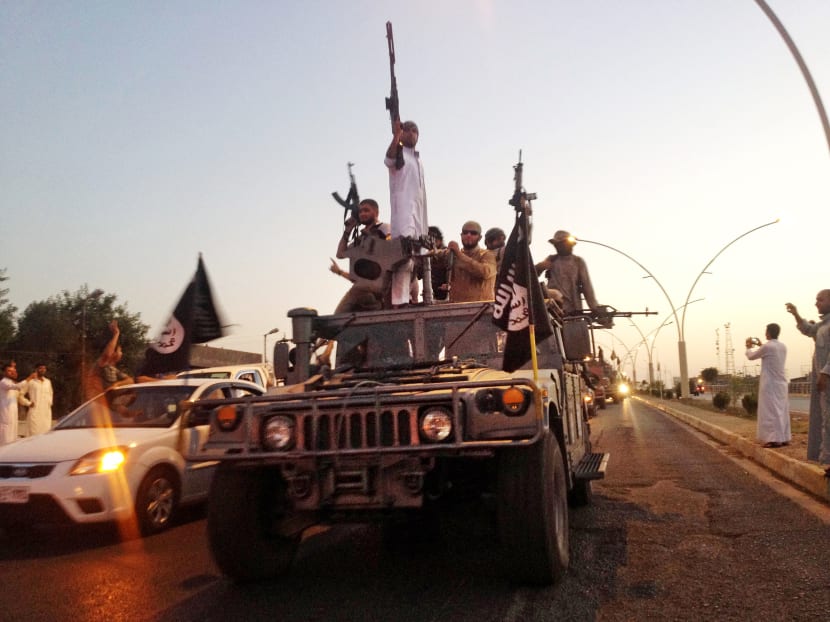S’pore to support effort against Islamic State
SINGAPORE — The Republic will join the United States-led multinational coalition against the Islamic State militant group and provide support while based in countries surrounding Syria and Iraq, but combat troops will not be deployed.

The Islamic State could potentially sustain its efforts for some time by using the rich oil resources in the territories it has occupied, said Dr Ng. Photo: AP
SINGAPORE — The Republic will join the United States-led multinational coalition against the Islamic State militant group and provide support while based in countries surrounding Syria and Iraq, but combat troops will not be deployed.
The support includes sending Singapore Armed Forces (SAF) liaison and planning officers to the US Central Command and the Combined Joint Task Force HQ, a KC-135R tanker aircraft for air-to-air refuelling, and an Imagery Analysis Team.
Announcing this decision in Parliament yesterday, Defence Minister Ng Eng Hen said contributing to the international effort to tackle the Islamic State threat at source — named Operation Inherent Resolve — is contributing directly to Singapore’s security.
Singapore had responded to the terrorist threat from Al Qaeda and Jemaah Islamiyah (JI) by strengthening defences at home and joining other countries to deal with forces in Iraq and Afghanistan. “As a result, both (Al Qaeda) and JI are weaker today,” Dr Ng said. “We must continue the approach that has served Singapore well and protected us thus far.”
The announcement comes after Prime Minister Lee Hsien Loong said last month that Singapore was considering how it can be a helpful partner in the fight against the Islamic State. Speaking at the 10th Asia-Europe Meeting in Italy, Mr Lee had said Singapore views extremist groups such as the Islamic State as a threat, as radicalised individuals could return to launch attacks on home soil.
Yesterday, Dr Ng noted the Islamic State could potentially sustain its efforts for some time by using the rich oil resources in the territories it has occupied. It has also used the Internet and social media in a sophisticated way to attract jihadists from around the world and extend its links to other religious militant groups.
An estimated 10,000 to 20,000 foreigners have been reported to be in Iraq and Syria, and about 350 South-east Asians — some of whom are from Singapore, Indonesia and Malaysia — are said to be among them.
“It is in Singapore’s interest to support the multinational efforts against ISIS. ISIS exports terrorism to our region, whether by sending foreign terrorists to carry out terrorist operations or radicalising regional elements who engage in violence in Iraq, Syria and subsequently their home countries,” Dr Ng said.
The assets that Singapore will contribute to the coalition against the Islamic State were previously deployed in Iraq and Afghanistan and have been effective and appreciated by international partners, he added.
Deployments in Iraq included more than 990 SAF personnel from 2003 to 2008 as part of a multinational reconstruction effort. In Afghanistan, more than 350 SAF personnel have been deployed since 2007 as part of the International Security Assistance Force peace support operations and reconstruction efforts led by the North Atlantic Treaty Organization.
Asked by Mr Alex Yam, Member of Parliament for Chua Chu Kang GRC, about the length of the deployment and the possibility of personnel engaging in combat, Dr Ng said the situation in Iraq and Syria was fluid and extremely dynamic. The length of deployment would be reviewed every year, taking into account the effectiveness of the joint efforts, he said, adding that the current scope of deployment would suffice for now.
While SAF servicemen deployed to the coalition’s operations will face risks, the Government will ensure that they are well-equipped and receive additional training in weapon handling and against improvised explosive devices and other hostile elements, he added.
On efforts to engage Singaporeans on this mission, Dr Ng said the Government had started doing so through closed-door discussions with small groups of Singaporeans, an approach it would continue.
The other 33 countries in the coalition include Saudi Arabia, the United Arab Emirates, Bahrain, Qatar, Jordan, Japan, South Korea, Britain, France and Canada. These countries have provided military support or humanitarian aid.







